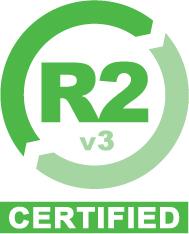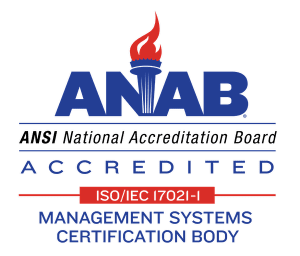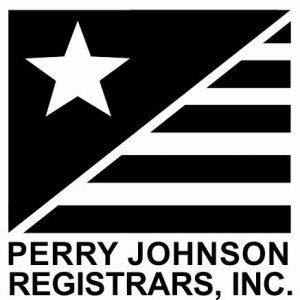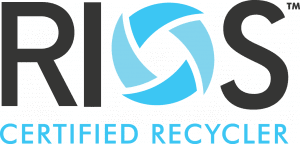- Georgia Computer Inc.
- About
- Certifications
R2v3 and RIOS Certified Recycling
R2v3 and RIOS Certifications
Because 50 million metric tons of e-waste is generated per year, recycling is an essential component of ITAD. The fastest growing waste stream globally, e-waste requires strict recycling standards in order to protect human and environmental health, as well as sensitive data. Those standards are known as R2v3 and RIOS.
What Is R2v3 Certification?
R2 is shorthand for Responsible Recycling. It’s the global certification standard for the ITAD (IT Asset Disposition) industry. Created with guidance from the Environmental Protection Agency, R2 standards promote reuse and recycling. Rather than simply managing electronic waste, certified R2 recyclers help facilitate a circular lifecycle for IT equipment.
Version 3 (v3) is the most recent R2 update. R2v3 certification requirements have multiple benefits for ITAD teams, their clients, and the environment. They safeguard the people handling potentially hazardous materials, keep data secure, help preserve resources, and protect soil and water supplies from IT component waste.
R2v3 Standard Process Requirements
R2v3 outlines process requirements in six areas: Downstream Recycling Chain; Data Sanitization (Both Physical and Logical;) Test and Repair; Specialty Electronics Reuse; Material Recovery; Brokering
In addition to core competency, GCI meets 4 of the possible 6. Most ITAD companies have less than 4.
Downstream Recycling Chain
This means that ALL our downstream output is analyzed and approved. Our clients’ e-waste never ends up where it shouldn’t be.
Data Sanitization (Physical and Logical)
Physical: We physically destroy hard drives the correct & certified way, using the correct machinery.
Logical: We destroy data using software methods that are up to the set standards.
Both methods are double checked through QC, recorded properly, and meet a minimum NIST800-88 standard.
Test and Repair
We test everything we sell to a minimum standard. To achieve a saleable condition, we add memory, power supplies, hard drives etc. as necessary.
Brokering
GCI is certified to work with our brokering team to harness the best possible outcomes for our clients.
What Is the Process for Certification?
The certification process is intense, expensive, detailed, and quite thorough. GCI’s compliance manuals, forms and files exceed 1,500 pages each year. Each audit cycle is slightly different because auditor teams are rotated. The process is structured this way to ensure ITAD providers can’t “study to the test.” In other words, to maintain certification, we must consistently follow standards or face penalties and possible revocation.
Our last recertification audit was 100% of all processes, procedures and paperwork. It took 5 full days of auditing and 1 day of reviewing, during which the auditor team went over our business processes with a fine-tooth comb. On the other hand, surveillance audits typically take 3-4 days to complete.
These audits ensure that ITAD providers run a tight ship in order to meet R2 standards. GCI passed our last recertification audit with zero non-conformances!
What Is the Difference Between the Previous R2 Certification and R2v3?
Each version of the R2 standard aims to improve processes to better safeguard data, health, and the environment. The biggest difference in version three involves: Increased data destruction requirements, increased categorization requirements, and increased EH&S assessment and controls.
In terms of compliance, the REC (R2 Equipment Categories) is the biggest change. It asks all certificate holders to classify hardware in a more uniform fashion. Another change is how each certificate holder gets certified to their specific niches in addition to core competency. This allows customers to understand how much of the processing their ITAD partner is providing.
Additionally, because we at GCI do both Logical and Physical data destruction, we’re happy to see the extra scrutiny surrounding data eradication.
What Are the Benefits of R2v3 to GCI’s Customers?
The newest R2 standard update establishes more effective EHS controls. This helps prevent damaging environmental incidents and promotes worker safety. As mentioned above, it also creates greater scrutiny around data eradication. Logical and Physical data destruction has been improved with verification standards and cross check requirements (which GCI already had in place.) This allows ITAD customers more confidence in the effectiveness of the data destruction process.
Additionally, customers can review their provider’s R2v3 certificate and see just how much of the processing their provider is doing for them. GCI does almost everything! Please talk to your GCI consultant for details on how much we can do for you.
What Is RIOS Certification?
RIOS stands for Recycling Industry Operating Standard. Designed for recyclers, by recyclers, RIOS is an integrated Quality, Environmental, Health and Safety Management System. Affecting recyclers across all commodities, RIOS takes a risk-based approach to QEHS within recycling facilities. A properly implemented RIOS management system decreases negative environmental impacts, improves health and safety, and ensures easier quality control for recycling facilities.
Managed by the Global Recycling Standards Organization, RIOS partnered with the R2 certification program in 2021. This alliance strengthened training and education programs and streamlined the process for companies seeking both R2 and RIOS certifications. It’s overseen by SERI, Sustainable Electronics Recycling International.
How Often Is GCI Required to Go Through the Certification Process?
Getting R2/RIOS certified involves considerable time and effort. First time certification requires a two-stage audit by a SERI-approved certification body. This initial process can take 8-12 months to complete.
R2v3/RIOS certifications last for three years and can be revoked at any time. The first year of certification involves a total 100% examination of all processes, documents, procedures, and paperwork.
Years two and three of certification are surveillance audits. These audits examine a select 60-65% of all processes. Which 60-65% is unknown until a week before the audit.
GCI Is Your R2v3/RIOS Certified Recycling Partner
The Combined R2/RIOS certification is recognized by the U.S. General Services and the U.S. Environmental Protection Agency. Choosing an R2/RIOS certified ITAD vendor helps protect the environment and reduces risk to your business, data and brand. GCI not only complies with but exceeds all EPA regulations and guidelines for handling e-waste. If you’re looking for an ITAD partner with R2v3 and RIOS certification, look no further than GCI. Contact us today to get started.
R2v3 and RIOS Certifications
Because 50 million metric tons of e-waste is generated per year, recycling is an essential component of ITAD. The fastest growing waste stream globally, e-waste requires strict recycling standards in order to protect human and environmental health, as well as sensitive data. Those standards are known as R2v3 and RIOS.
Understanding Recycling Standards
Electronic equipment is highly toxic to the environment, and at GCI we are firmly committed to reducing the impact electronic waste has on our world. As an RIOS and R2 certified recycling company, we follow the strictest standards of equipment and materials management. We process used electronics in order to make the materials more suitable for reuse. Our goal is to turn everything we collect into a reusable stream of components or commodities. Through our reduce, reuse and recycle process, GCI is setting the standard for reducing e-waste.
R2 and RIOS are separate but complementary standards that govern the recycling industry. RIOS was developed for the broader recycling industry, and covers all attributes from quality to safety to environmental protection. R2 is best practices specific to electronic waste. Combined, an R2 certification and RIOS certification ensures that your ITAD vendor has an audited management system in place.
RIOS Certification
The Recycling Industry Operating Standard (RIOS) was developed by leading experts to provide a framework for understanding, evaluating and eliminating risk within a recycling operation.
Key requirements in the RIOS Standard include:
- The RIOS Footprint – Evaluations of Risks and Impacts
- Development and Implementation of Operational Controls
- Communication Procedures (Internal and External)
- Goal Setting and Continual Improvement
- Process for Measuring and Monitoring Effectiveness
R2 Certification
Responsible Recycling (R2) is the industry standard for the responsible handling of end-of-life electronics. Created by Sustainable Electronics Recycling International (SERI,) R2 certification recognizes vendors with comprehensive health, safety and environmental management systems in place. R2 certification is international, as the safe handling of e-waste is a global concern.
R2 certification covers:
- Environmental, Health and Safety Management Systems
- Reuse & Recover Hierarchy of Responsible Management Strategies
- Legal Requirements
- Reusable Equipment and Components
- Tracking
- Data Destruction
- Focus Materials
- Storage
- Security
Benefits of Certified Recycling
Responsible recycling of e-waste provides important advantages to the client, the vendor, and to the earth itself.
Benefits include:
- Reducing Environmental and Human Health Impacts
- Reducing Energy Use
- Conserving Natural Resources
- Minimizing Environmental Impacts from Mining and Processing of Virgin Materials
- Increasing Access to Quality Reusable and Refurbished Equipment
- Brand Protection and Risk Minimization
Quality You Can Trust
The Combined R2/RIOS certification is recognized by the U.S. General Services and the U.S. Environmental Protection Agency. Certification is fully audited every three years, and includes shorter surveillance audits in the interim years to ensure compliance. Only facilities that conform to all provisions of the standard and are current on required audits and oversight are permitted to claim R2 certification for ITAD. Choosing an R2/RIOS certified ITAD vendor not only helps protect the environment, it also reduces risk to your business, data and brand. GCI not only complies with, but exceeds all EPA regulations and guidelines for handling e-waste.

R2 v3 Recycling

ANAB

Perry Johnson




